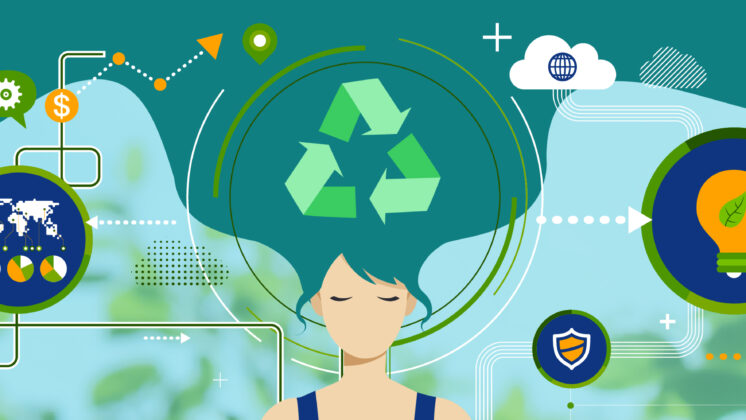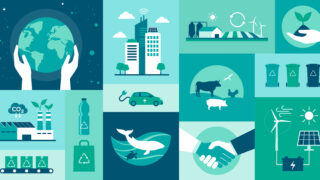Sustainable Innovation in Times of Disruption: Choices for a Better Society
There are opportunities for progress all around us. The key is to innovate on these opportunities sustainably.
To help identify most effective path forward, you'll need to gain a global perspective to these challenges in an open discussion. How can Japan and the world take action to create a more sustainable, innovative world? Where do you fit in?
It's time to find out.
Sustainable entrepreneurship is a business model focused on the innovation of new products, processes and services that create economic, environmental, and social value with long-term benefits.
Practicing social innovation and entrepreneurship disrupts traditional profit-centric business in favor of “creative destruction” that tackles an environmental and/or social problem. Whether it’s a biodegradable plastic bag made from seaweed, or the world’s first ethically made sustainable smartphone, these sustainable enterprises trump existing methods of unsustainable production, consumption and distribution.
Sustainable Innovation in Times of Disruption: Choices for a Better Society
There are opportunities for progress all around us. The key is to innovate on these opportunities sustainably.
To help identify most effective path forward, you'll need to gain a global perspective to these challenges in an open discussion. How can Japan and the world take action to create a more sustainable, innovative world? Where do you fit in?
It's time to find out.
Why should you care about sustainable entrepreneurship?
While sustainability used to be seen as a business risk (higher costs and reduced competitive advantage), new research suggests that sustainability innovations actually improve the bottom line.
In its “100 Most Sustainable Corporations of 2022” report, Canadian sustainability-focused media and research company Corporate Knights found that nearly 7,000 companies that rank the highest at reducing carbon and waste generate more than US$1 billion in revenue.
Going green has also been proven to reduce costs and improve operational efficiency. Governments may also offer tax incentives and rebates for businesses with sustainable initiatives.
Sustainability also improves brand reputation and boosts a company’s competitive advantage. Research shows that a growing number of consumers are using sustainability as a yardstick when considering what they buy. Many of these consumers are young–millennials and Gen-Zers–who are driving the growth of greener brands, products and companies to work for.
What are the challenges of social innovation and sustainable entrepreneurship?
Determining what exactly sustainability means in business terms can be difficult.
At what point can a business call itself green? Are solar panels sufficient to reduce a company’s carbon footprint? Is it enough for businesses to use recyclable or biodegradable packaging in the fight against plastic pollution?
Introducing new green processes (and products) takes time and money. Seeing a return on investment could take years. Truly impactful solutions to climate change and material pollution require collective action for results to materialize.
One way to measure the impact of sustainability efforts is through environmental, social and corporate governance (ESG) metrics–a set of standards used by socially conscious investors to assess how well a business is upholding its sustainability commitments.
Next Article
Why Companies Need Sustainable Technology for a Sustainable Future
How to Transform Your Business with ESG Strategy
Identify market opportunities with an eye for social impact.
A sustainable enterprise can be a startup or an existing business that creates a new sustainable product or service. The question is: where to start?
One creative way to find sustainable business opportunities is to consult the 17 Sustainable Development Goals introduced by the United Nations in 2015 as part of its 2030 Agenda for Sustainable Development. These goals tackle environmental and social issues–such as poverty, hunger, gender equality, quality education and climate action–and have been integrated into the sustainability strategies of many companies.
Exploring these issues can help sustainable entrepreneurs zero in on a problem or need that requires an innovative solution which their business can provide–in a way that also supports global sustainable development efforts.
Make social and environmental goals the core of your business strategy.
While profit is necessary for business survival, sustainable entrepreneurship means setting clear goals that highlight sustainability and not just profitability. These goals should be measurable–such as reducing carbon emissions by 10% by a certain deadline or becoming a zero-waste company within the next 3-5 years.
Using industry-standard sustainability guidelines or consulting an expert can help you develop an efficient sustainability strategy that supports your business goals. A good sustainability strategy will be able to identify operational risks caused by environmental and social factors.
Next Article
Your Morning Coffee Sustainability: An Alignment Chart
6 Ways to Measure Sustainability Value in Your Business
Define the future of sustainable entrepreneurship.
By 2030, the market for green businesses is expected to reach US$3.4 trillion. The World Economic Forum also foresees a US$10-trillion opportunity for businesses that focus on sustainability.
Despite these prospects, businesses and investors are still bumping heads over the importance of sustainability efforts. A recent report shows that 78% of investors believe in the need for more ESG initiatives, but only 55% of companies are taking action.
Current environmental trends in biodiversity loss, climate change and global warming, plastic pollution and material waste paint a bleak picture of mankind’s shared future. More than 500 land animal species are endangered and likely to become extinct within the next 20 years. The world generates 300 million tons of plastic waste each year–91% of which cannot be recycled.
Humanity can’t turn a blind eye to the numbers. The data reveals that becoming sustainable is more than just a business strategy or passing fad: it is a moral imperative calling for urgent collective action.







